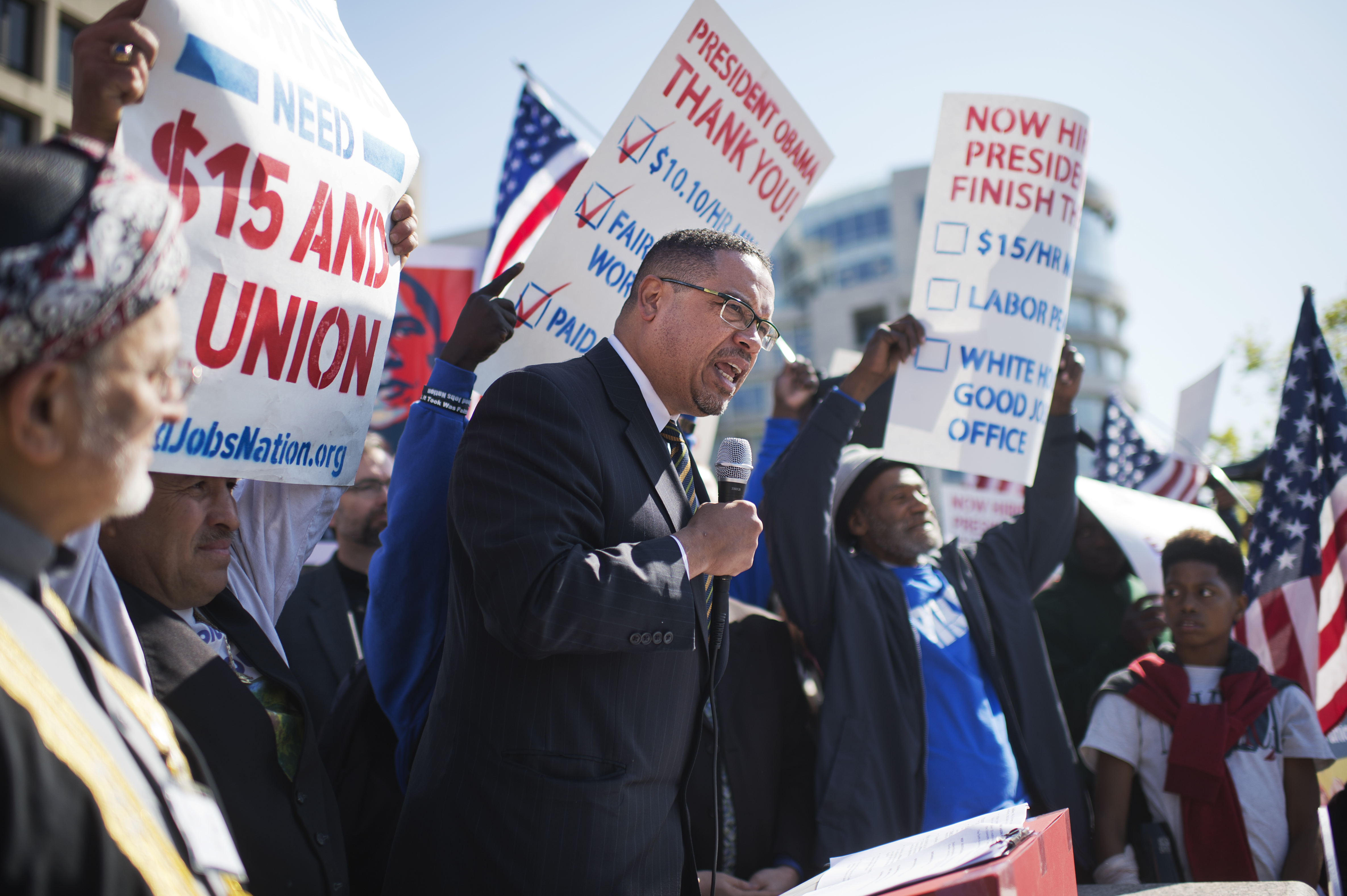Why Keith Ellison is the best choice to head the DNC
Time to reunite the party


A free daily email with the biggest news stories of the day – and the best features from TheWeek.com
You are now subscribed
Your newsletter sign-up was successful
Should Rep. Keith Ellison (Minn.) be the new leader of the Democratic Party?
Now that the Democrats have been cast into the political wilderness by President-elect Donald Trump and the congressional GOP, they will have to rebuild. Their first order of business is choosing a new leader: chairman of the Democratic National Committee (DNC).
Ellison is already officially in the running, and it's hard to imagine a better candidate: The congressman from Minnesota embodies the one-two punch of social justice and economic populism the Democrats will need to rise again.
The Week
Escape your echo chamber. Get the facts behind the news, plus analysis from multiple perspectives.

Sign up for The Week's Free Newsletters
From our morning news briefing to a weekly Good News Newsletter, get the best of The Week delivered directly to your inbox.
From our morning news briefing to a weekly Good News Newsletter, get the best of The Week delivered directly to your inbox.
Ellison is America's first Muslim-American congressman, and the first black American elected to Congress by the state of Minnesota. He's also one of the most reliably left-wing votes in the House: Ellison supports liberal immigration reform and reproductive rights, and literally picked up a guitar and sang "This Land is Your Land" to celebrate Minnesota's legalization of gay marriage. A stout defender of unions, he is also co-chair of the Congressional Progressive Caucus, whose proposed budget is basically a Bernie Sanders wish list.
He also represents an important bridge between the two main factions of the Democratic Party.
When Democrats were upset in the 2016 election, it re-opened a fissure in the party that first emerged during the primary battle between Sanders and Hillary Clinton. On one side was the liberal establishment, which felt that the best way to fight Trump was to take unabashed stands on feminism, anti-racism, and gay rights without full-throated economic populism. On the other side was the more progressive wing of the party, which agreed with the first part but wanted to advocate for a genuinely leftist economic policy.
Since the election, these factions have usually been presented as an either/or choice. But that's not quite right; left-wing economic populism only strengthens progressive social stances.
A free daily email with the biggest news stories of the day – and the best features from TheWeek.com
Economic populism increases turnout and enthusiasm within the Democratic coalition, from the black working class to college students, and drives a wedge into the very large population of blue-collar whites. That gives the Democrats breathing room to move further left on non-economic issues that might otherwise drive off white voters. As Bill Clinton demonstrated, the Democrats don't throw anti-racism and feminism under the bus to protect economic populism — they do it to protect pro-corporate centrism.
With his background and record, Ellison seems perfectly positioned to make this argument and reunite liberals' warring factions. And much of the Democratic leadership seems to agree.
The latest changes in the Senate's Democratic leadership placed hard-charging leftists like Sanders and Elizabeth Warren in positions of considerable power, alongside establishment heavy-hitters like incoming Senate Minority Leader Chuck Schumer. All three have thrown their support behind Ellison, along with outgoing Senate Minority Leader Harry Reid.
"To me, overwhelmingly, we did not have a strong economic message," Schumer told Huffington Post. "What we need is a sharper, bolder, stronger, more progressive economic message."
"Bernie [Sanders] convinced me of this," Schumer added, explaining why he supports Ellison. In particular, Ellison is widely admired for his ability to combine campaigning and governance with grassroots community activism. Sanders and others are pushing to reshape the DNC to grow the grassroots, as opposed to fundraise. Ellison's links with the labor movement would be key here: Unions are arguably the one organizing force that can make Democrats competitive again across state government elections in particular.
Not everyone is thrilled with the choice of Ellison as DNC chair, however.
Some Democratic power-brokers in President Obama's orbit expressed reservations to The New York Times. Many of their complaints boil down to good old-fashioned Democratic establishment cowardice: Ellison is too bold or left wing. Some of those operatives also clearly don't like the idea of effectively conceding that Sanders was right in his critique of the party.
But there's also a more pragmatic objection: Namely, that being DNC chair is a full-time job, and Ellison would be doing double-duty as a sitting congressman.
It's a plausible concern. Ellison wouldn't be the first DNC chair to hold two jobs, and his supporters are confident he can handle the workload. But if that's an issue, Tom Perez, who will leave his job as labor secretary as soon as the Obama administration ends, could possibly pull off the same political reorientation of the party without the burden of holding two jobs at once.
But even if the Democrats ultimately pick someone else for DNC chair, they need to remember that Ellison's strength does not lie merely in who he is. It lies in the vision and strategy he would champion.
Jeff Spross was the economics and business correspondent at TheWeek.com. He was previously a reporter at ThinkProgress.
